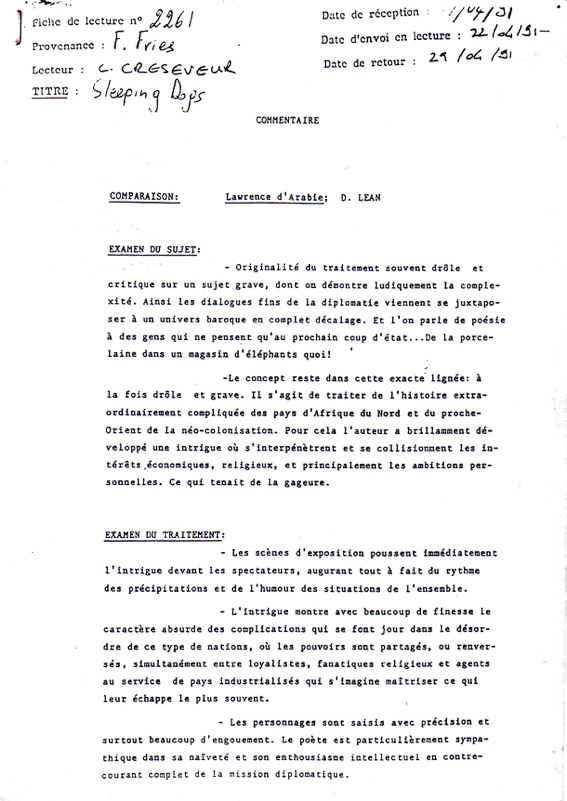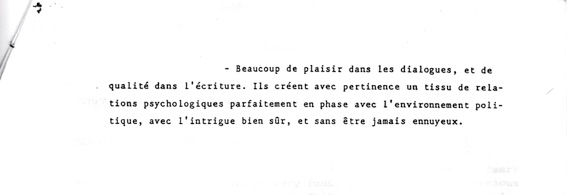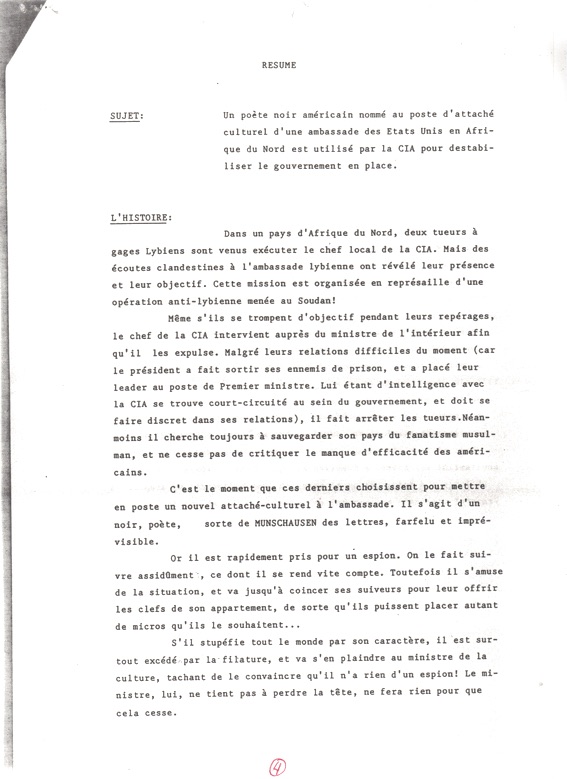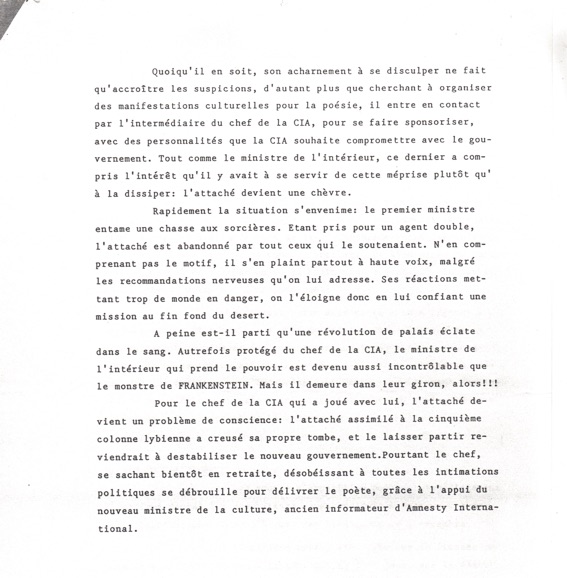New Dominion Pictures, which has made hundreds of episodes for the National Geographic, Discovery and Travel channels, shot preparatory footage in October 2009 for a possible TV series about deep time using me as the host.
I’ve also presented sequences concerning the history and prehistory of Lourdes for the Travel Channel and am preparing films on the archaeology of the eastern Sahara and the little-known cave art of northern France.
One of my most ambitious film projects was a screenplay-cum-novel called “Sleeping Dogs”. Although this fictional feature-length movie was never shot, an executive from Columbia France offered to buy it on behalf of himself and three partners (rather than his employer), before being hospitalized and leaving the industry. Then another studio, Gaumont Film Company, rejected it, only to change its mind. Here’s how I got Gaumont’s internal review - which appears at bottom.
I don’t know anybody in the literary or film worlds in the United States, so, as an American in Paris, I naturally sent the treatment to Gaumont, which was the largest studio and cinema chain in Europe at the time and had begun to branch into English-language films. I knew Gaumont would at least read the project, while American companies were insisting that they wouldn’t open unsolicited material.
Not surprisingly, I received a rejection slip.
But I decided to call the Gaumont executive, François Fries, who was listed on the form, to ask if Gaumont had rejected the film based on a reader’s report. Mr. Fries said it had.
“If you’d read me the critique,” I ventured, “I promise not to say a word in defense of the manuscript since I just want to know what weaknesses the reader found, so I can avoid them in my next screenplay. I promise, I’ll just thank you, say goodbye and hang up.”
Mr. Fries felt that was fair and agreed to read the review. He prefaced the reading by saying that the negative comments in the report were the reasons why the firm had rejected my script. After asking me the name of the screenplay, which he never seemed to have heard of, François found the following report and started reading it in a fast mumble – hardly listening to himself as he raced through to get me off the phone. Ironically, we were equally slow on the up-take, since François wasn’t paying full attention to what he was reading and I was a foreigner, whose comprehension of the kind of aphoristic literary French, which the report is written in, is a bit slow, especially when it’s delivered at breakneck speed, so we realized nearly simultaneously that the reader - who I later learned was the French screenwriter, Christian Creseveur - had found no flaws and loved the “brilliant” treatment for the “great finesse” with which it had “pulled off a long shot”.
Mr. Fries became flustered and said that he hadn’t seen the report - that he’d simply thought the project couldn’t be for Gaumont because it was in English - so he offered me a job on the spot to make up for the gaffe, while he tried to push the project to the next level. I accepted and ended up working on a variety of projects even after Fries had resigned, partly because he couldn’t convince his superiors to invest in unknowns like myself, whereupon the chairman’s 20-something daughter succeeded Fries and cleaned out his desk.
But, before departing, François had given me this document, for what it was worth.
For decades, it lay in a draw with my scenario as I plunged into caverns and deserts and left attempts at cracking the film world far behind.
Scans of the original document are posted below the English translation.
PAGE 1:
(Gaumont) Reader’s Report 2261 Reception date: 17/04/91
Sender: F. Fries Date sent for reading: 22/04/91
Reader: C. Creseveur Date returned: 29/04/91
TITLE: SLEEPING DOGS
Commentary
COMPARISON:Lawrence of Arabia; D. LEAN
EXAMINATION OF THE SUBJECT:
-Originality is the hallmark of this probing and often very funny treatment of a serious subject as its complexity is playfully untwined. Refined diplomatic dialogues are juxtaposed with a zany universe skidding out of control. Poetry is offered to people who think of nothing but the next coup d’état. – Speak about china in a shop full of elephants!
-The concept remains within this precise approach: at once funny and serious. In order to successfully deal with the extraordinarily complicated history of neo-colonialism in North Africa and the Middle East, the author has brilliantly developed an intrigue in which economic and religious interests, and, most importantly, personal ambitions, interpenetrate and collide. He has pulled off a long shot.
EXAMINATION OF THE SUBJECT’S TREATMENT:
-The audience is thrust immediately into the plot in the opening scenes which have the quick pacing and humor that are maintained throughout the film.
-The intrigue shows with great finesse the absurd character of complications which arise in this type of country, in which power is divided, or overthrown, simultaneously among loyalists, religious fanatics and agents in the service of industrialized nations which imagine that they have mastered what usually escapes them.
-The characters are drawn with exactitude and a great deal of verve. The poet is particularly attractive in his naivete and creative enthusiasm – which is at complete cross purposes with his diplomatic mission.
-A lot of pleasure in the dialogues and quality of the writing. They coherently weave a web of psychological relationships which are perfectly in phase with the political environment, and, of course, the intrigue, while never being boring.
PAGE 2:
(Gaumont) Reader’s Report 2261 Reception date: 17/04/91
Sender: F. Fries Date sent for reading: 22/04/91
Reader: C. Creseveur Date returned: 29/04/91
TITLE: SLEEPING DOGS
SUMMARY
SUBJECT:
A black American poet who has been named Cultural Attaché in an American Embassy in North Africa is used by the CIA to destabilize the government in power.
THE STORY:
Two Libyan hit men arrive in a North African country to assassinate the C.I.A.'s local chief. But bugs hidden in the Libyan embassy reveal the assassins' presence and targets. Their mission is in retaliation for an anti-Libyan operation in the Sudan!
Even though the hit men mistake their target while reconnoitering, the CIA chief is forced to ask the Interior Minister to expel them. Despite their difficult relationship at the moment*, it is necessary to arrest the killers.
(* Their relationship has been complicated by the fact that the president has just freed the minister’s enemies from prison, and appointed their leader to be Prime Minister. Given that the Interior Minister has been working with the CIA, he now finds himself short-circuited in the heart of the government, and has to be discreet in his dealings.)
All the same, the minister keeps trying to protect his country from Muslim fanaticism, and never stops criticizing the Americans’ lack of efficiency.
This is the moment that the latter chose to appoint a new cultural attaché at the embassy. He happens to be a black, a poet, a sort of MUNCHHAUSEN of letters, eccentric and unpredictable.
He is quickly taken to be a spy. He is followed assiduously, which he quickly realizes. He is even amused by the situation, and goes so far as to corner his tails to offer them the keys to his apartment so they can plant as many bugs as they want….
His character stupefies everyone – especially as the tailing exasperates him - and the attaché goes to complain to the Minister of Culture in an attempt to convince him that he is anything but a spy! The Cultural Minister, not wanting to lose his own head, does nothing to stop the situation.
No matter what the poet does, his relentless attempts to prove himself innocent only increase suspicions, all the more so when – in an effort to launch cultural events around poetry – the real CIA chief gets him to contact notables who the CIA wishes to compromise with the government. Along with the Minister of Interior, the CIA chief has understood the interest of taking advantage of this confusion, rather than dissipating it: so the attaché becomes a decoy.
The situation is rapidly enflamed. The Prime Minister launches a witch-hunt. Being taken for a double agent, the attaché is abandoned by everyone who had supported him. Not understanding the reason, he complains loudly everywhere – despite nervous recommendations that are sent his way. Since his reactions are putting too many people in danger, the embassy tries to put distance between it and the attaché by sending him on a mission to the remotest part of the desert.
Hardly has he left, when a palace revolution breaks out in bloodshed. Although the Interior Minister used to be one of the CIA chief’s “assets”, he becomes as uncontrollable as Frankenstein’s monster as he takes power. But, after all, he remains true to character.
For the CIA chief who has toyed with the poet, the attaché becomes a problem of conscience: the attaché has dug his own grave by making it look like he is linked to a Libyan 5th column, and letting him go would destabilize the new government. All the same, the chief, knowing he is about to retire, and disobeying heavy political intimidation, manages to free the poet thanks to the clout of the Minister of Culture – an old informant for Amnesty International.
Scans of the original document.




Contact information: Duncan Caldwell
Tel. Nov. thru June: +33-14804-0356 / July thru Oct: +1-508-645-2009
© 1991 Duncan Caldwell on text, © 2009 on photos






